‘Within hours’: Ground invasion fears as Israel pounds Lebanon
An intelligence expert has issued a chilling warning about Israel’s next move as fighter jets launch dozens of fresh strikes on the Bekaa region near Beirut and desperate families flee.
World
Don't miss out on the headlines from World. Followed categories will be added to My News.
Experts warn Israel forces are expected to march across the Lebanon border within hours, as attacks on dozens of Houthi targets in Yemen increase fears of a wider regional war.
“I now expect within hours that the Israeli army is going to march into southern Lebanon in the first instance, and we will see yet a further escalation,” intelligence expert Anthony Glees told The Sun.
“If Hezbollah won’t hand over their weapons – and they won’t – then the Israeli Defense Force is going to go in there and take the weapons off them.”
Israel has in recent days shifted the focus of its operation from Gaza to Lebanon, where heavy bombing has killed hundreds since last Monday and has displaced over 200,000.
The latest update is a barrage of fresh strikes on Hezbollah targets in Lebanon’s Bekaa region, about 30km from Beirut, launched early on Monday morning.
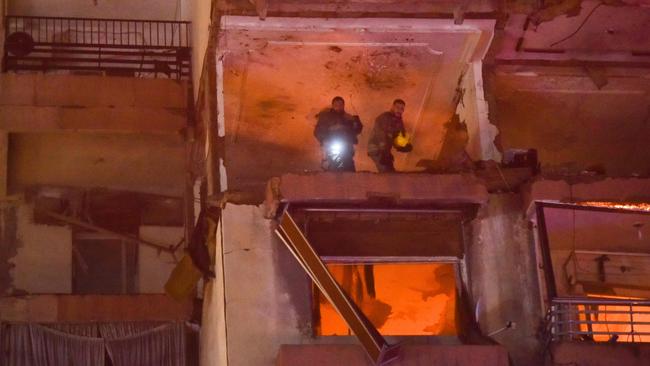
Fighter jets “attacked dozens of launchers and buildings where weapons were stored in the Bekaa in Lebanon,” it said in a statement on Telegram.
Israel “will continue to attack powerfully, damage and degrade Hezbollah’s military capabilities and infrastructure in Lebanon”, it added.
Earlier Monday, a Lebanese security source said an Israeli strike on a Beirut apartment block killed four people in the first attack on the city centre since the Gaza war began.
At least 105 people were killed in Israeli strikes on Sunday, with 359 people wounded, according to Lebanon’s health ministry.
Hezbollah began firing into Israel one day after Hamas’s October 7 attack on southern Israel that sparked the war in Gaza.
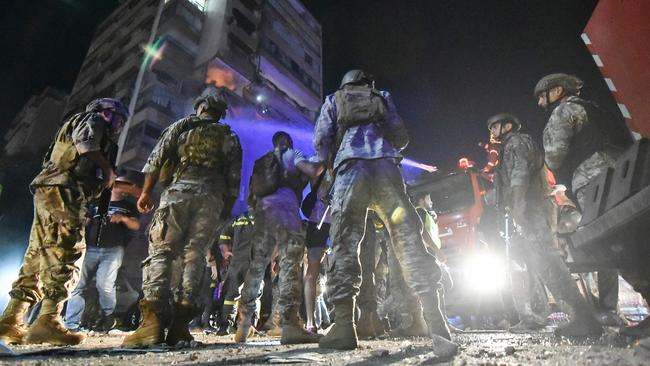
The Israel Defense Force is fighting on multiple fronts, having targeted power plants and facilities in the Yemeni city of Hodeida in response to a Houthi ballistic missile attack on Ben Gurion international airport as Israel’s Prime Minister Benjamin Netanyahu was arriving.
Houthi media reports said the strikes killed four people and wounded 33.
An “unmanned aerial target” approaching Israel over the Red Sea – where the Houthis have regularly attacked shipping – was intercepted earlier Sunday local time, Israel’s military said.
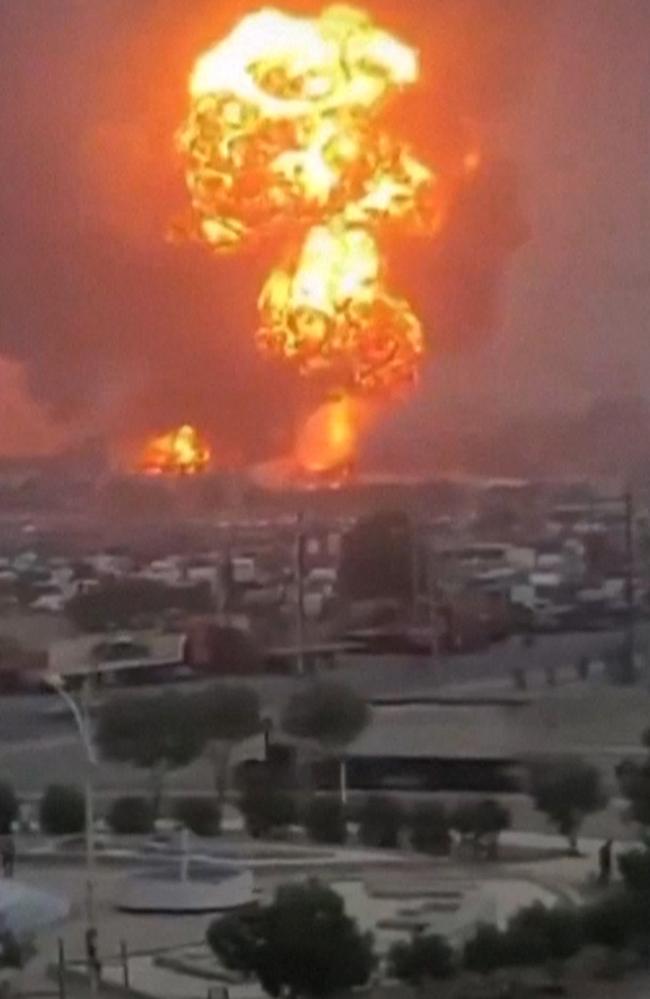
FOLLOW UPDATES BELOW:
SYRIANS CELEBRATE DEATH OF DICTATOR’S BROTHER
Syrians are taking to the streets and social media, celebrating unconfirmed reports of the death of dictator Bashar al-Assad’s brother in an Israeli air strike near Damascus.
General Maher al-Assad, 56, is the commander of the Syrian Army’s elite 4th Armoured Division, which has played a vital role in smuggling Iranian weapons to Hezbollah.
It’s believed he was in a villa in the Yafour area when contact was lost.
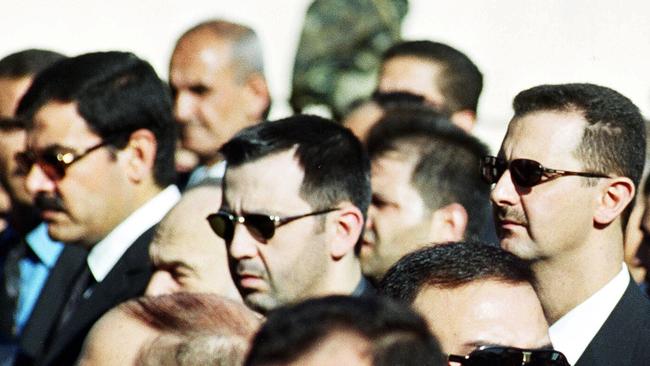
HEZBOLLAH DEPUTY HEAD CONFIRMED DEAD IN LEBANON
The IDF said it had killed another top Hezbollah official in an air strike following the killing of the militant group’s main leader, Hassan Nasrallah.
The IDF said Nabil Qaouk, the deputy head of Hezbollah, has been killed and the militant group later confirmed this.
Kaouk was a veteran member of Hezbollah and was the military commander in southern Lebanon during the 2006 war with Israel.
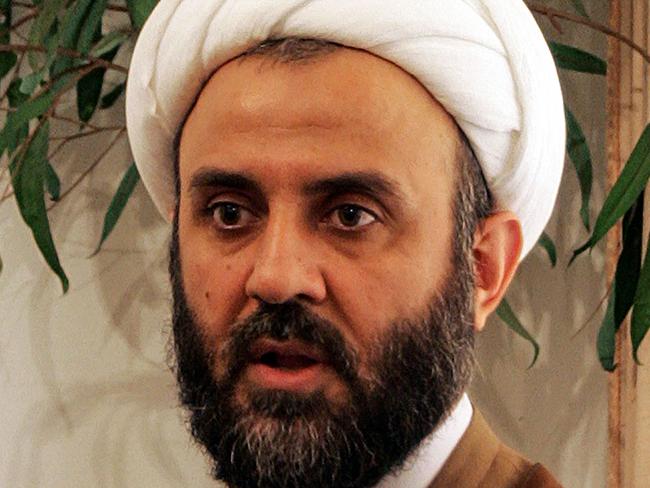
He is the seventh senior Hezbollah official killed in Israeli strikes this past week.
Meanwhile, a source close to Hezbollah said Nasrallah’s body was found on Saturday “and was placed in a shroud on Sunday after being washed”. Funeral details have not yet been arranged, the source said, requesting anonymity.
The total toll of key Hezbollah militants is around 20, including two close associates of Nasrallah.
WHITE HOUSE CALLS FOR TEMPORARY CEASEFIRE
US security spokesman John Kirby said Israel had “wiped out” Hezbollah’s central command but warned that the group will quickly rebuild it.
He told CNN that the White House continues to urge Israel and Hezbollah to agree to a 21-day temporary ceasefire.
France also appealed for Hezbollah and its backer Iran to abstain from any action that could lead to “regional conflagration”.
Pope Francis, asked about Israeli air strikes on civilians, said a country “goes beyond morality” when defence is not proportional to the attack.
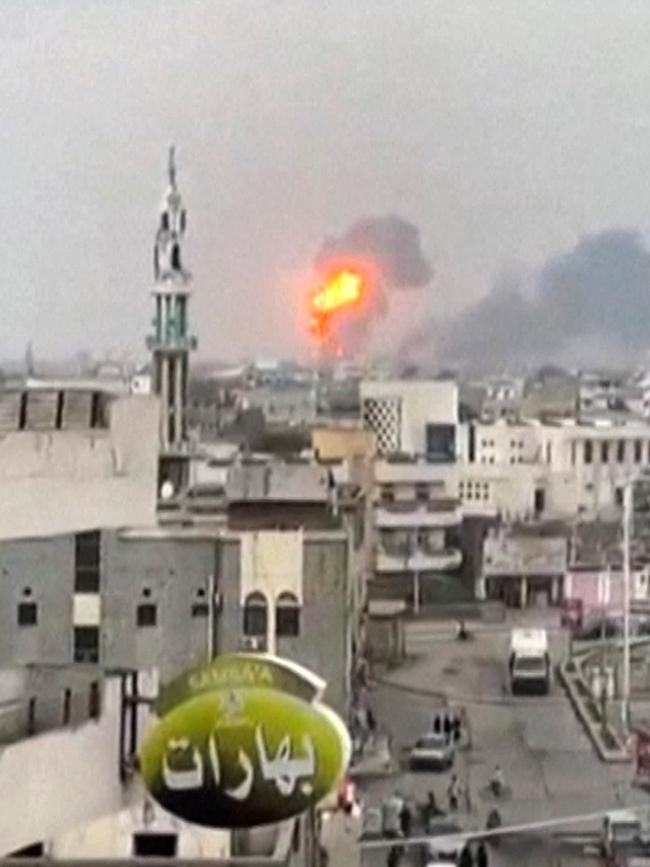
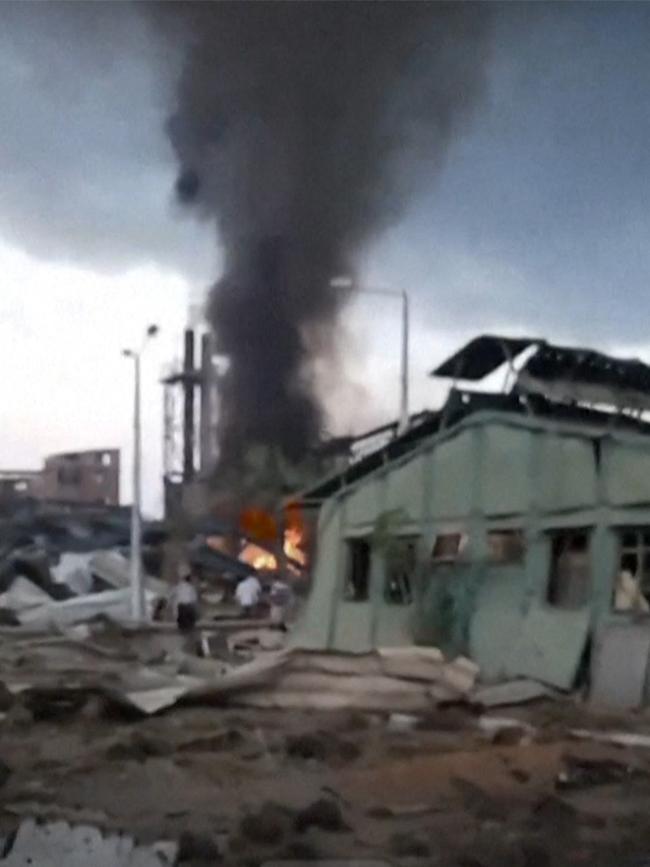
PROTESTERS IN AUSTRALIA THREATENED WITH VISA CANCELLATIONS
Home Affairs Minister Tony Burke says he will consider cancelling the visas of anyone who incites ‘discord” in Australia after protesters waved Hezbollah flags at protests in Sydney and Melbourne on the weekend in support of Hassan Nasrallah.
Mr Burke said “any indication of support for a terrorist organisation is unequivocally condemned”.
“It draws the immediate attention of our security agencies. There is a higher level of scrutiny if anyone is on a visa. I have made clear from day one, that I will consider refusing and cancelling visas for anyone who seeks to incite discord in Australia,” he said.
Islamic Council of Victoria’s president Adel Salman said those supporting Hezbollah were a small minority.
“They are definitely a minority. An absolute, tiny minority. From my own experience, my knowledge of the community, there is no support of Hezbollah, no love of Hezbollah, right now, this is all about support for the Lebanese people,” Mr Salman said.
ISRAEL POUNDS LEBANON, TARGETING HEZBOLLAH
Israel continues to carry out targeted strikes on Lebanon.
Israel’s army said about 120 Hezbollah targets were hit in the latest strikes in Lebanon.
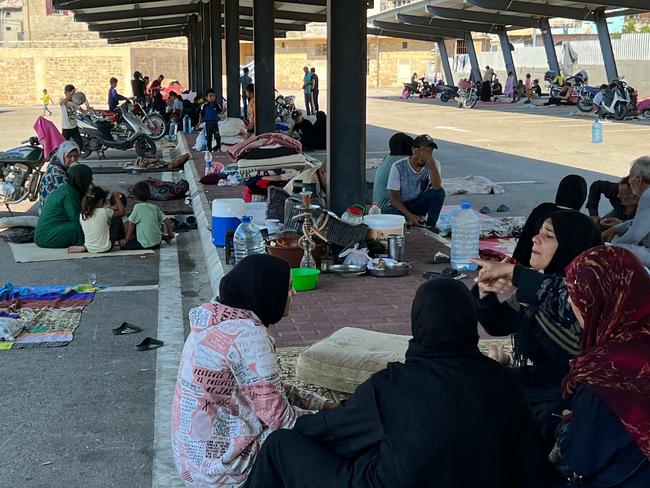
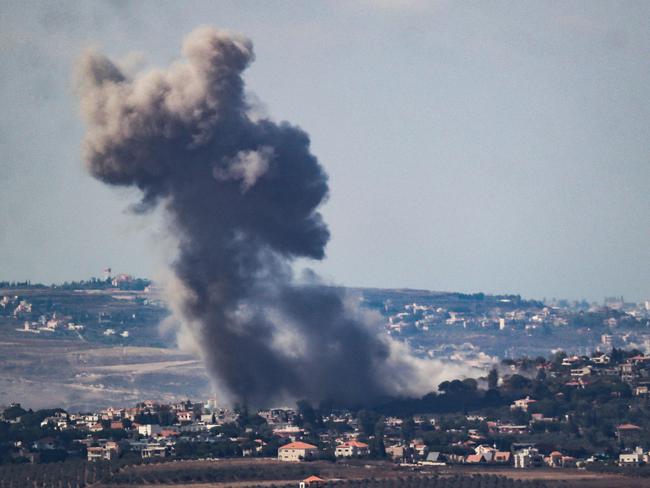
HEZBOLLAH STRIKES BACK
Hezbollah said it targeted two north Israel locations including the town of Safed, an area it has fired at several times over the past week.
The Iran-backed group said its fighters launched a “rocket salvo” at Safed and a smaller location “in defence of Lebanon and its people and in response” to Israeli attacks on cities, villages and civilians.
Meanwhile, the Israeli military said it was carrying out fresh strikes on targeting Hezbollah’s weapons storage facilities and infrastructure sites in Lebanon.
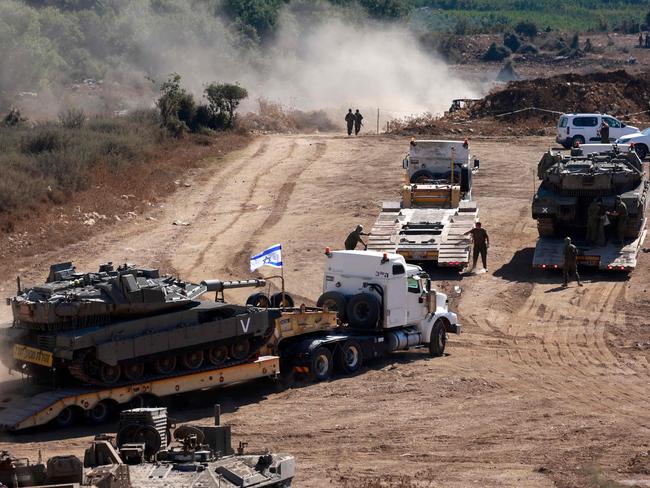
“Over the last few hours, IDF (military) fighter jets struck Hezbollah terror targets in Lebanon, including launchers directed toward Israeli territory, weapons storage facilities, and terrorist infrastructure sites,” the military said in a statement.
A separate statement later said it had hit about 45 Hezbollah targets in the area of Kafra in southern Lebanon.
Among those targets struck were weapons storage facilities and infrastructure sites belonging to the group, it said.
ANOTHER FRENCH NATIONAL KILLED IN LEBANON
A second French national has been killed in Lebanon, France’s foreign ministry said, as Israel carried out fresh strikes against the country’s Iran-backed Hezbollah militants.
The announcement came as French Foreign Minister Jean-Noel Barrot flew into Beirut for talks with authorities and to bring humanitarian aid.
“We confirm the death of a second French national,” said the foreign ministry statement, adding that they would release more details later.
Last week, an 87-year-old French woman was killed when her home collapsed following an explosion in the south of the country.
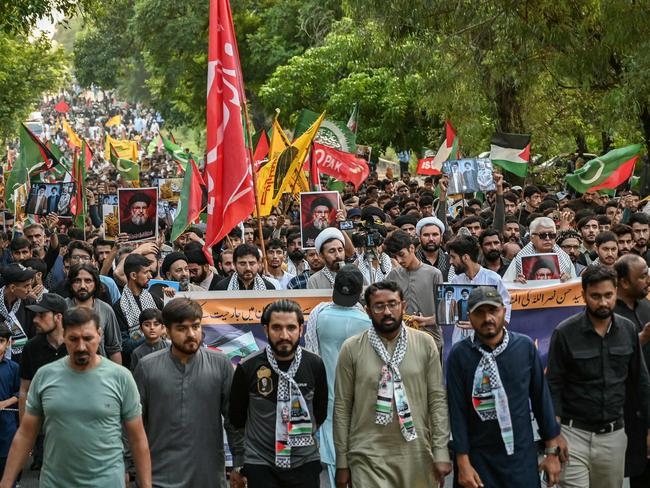
PROTESTS IN PAKISTAN, FRANCE, TURKEY
Thousands of people protested in Pakistan cities after the Iran-backed group Hezbollah confirmed that its longtime chief had been killed by an Israeli air strike in Lebanon.
An estimated 4000 people gathered in the Pakistan capital Islamabad and 3000 more in the southern port city of Karachi during rallies and funeral prayers for Nasrallah led by Shiite Muslim groups.
“We stand against what Israel is doing in Palestine and Lebanon, this is why we are here today,” 27-year-old Taskeen Zafar said during the rally in Islamabad.
“Pakistan strongly condemns the growing Israeli adventurism in the Middle East,” Pakistan’s Ministry of Foreign Affairs said, citing the killing as “a major escalation in an already volatile region.”
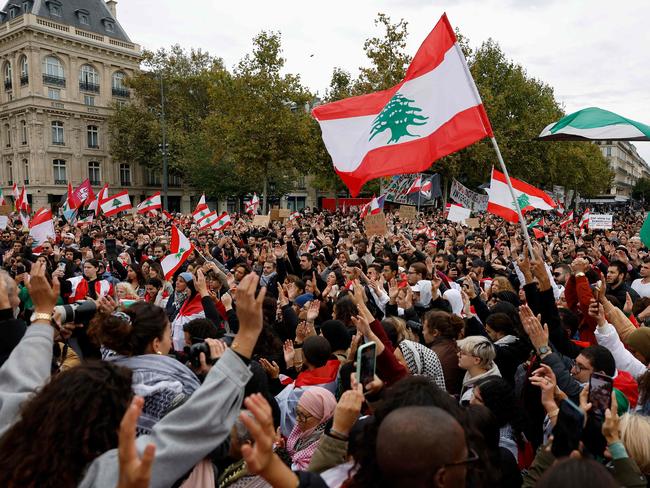
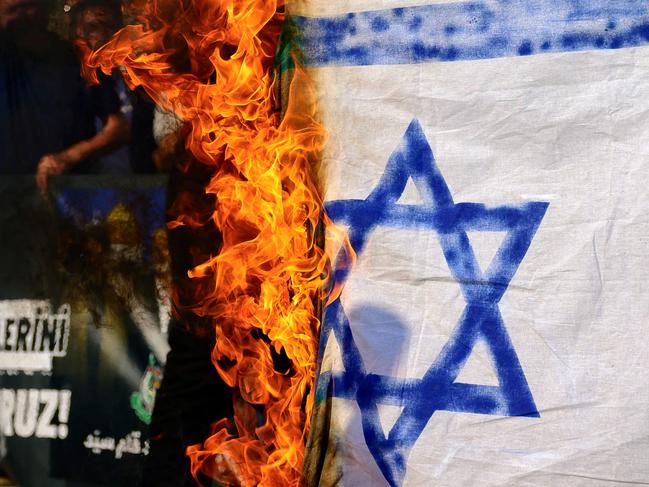
ISRAEL BEGINS ‘DOZENS’ OF NEW AIR STRIKES
Israel began new air raids against “dozens” of Hezbollah targets in Lebanon, after killing the Iran-backed group’s leader, Hassan Nasrallah.
Hezbollah confirmed that its leader Nasrallah was killed in an Israeli strike on Beirut’s southern suburbs, dealing a massive blow to the group he had led for decades.
His killing marks a sharp escalation in nearly a year of tit-for-tat cross-border fire between Hezbollah and Israel, and risks plunging the whole region into a wider war.
Israel continues to pound Lebanon with the military saying it “attacked dozens of terrorist targets in the territory of Lebanon in the last few hours”.
The strikes targeted “buildings where weapons and military structures of the organisation were stored”.
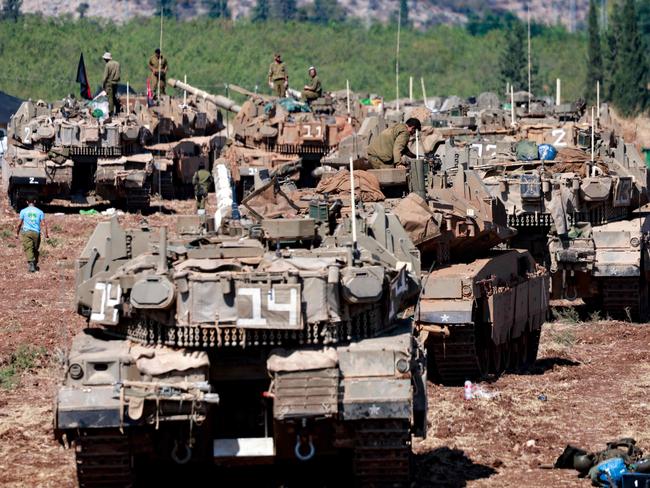
The military attacked hundreds of Hezbollah targets throughout Lebanon as it sought to disable the group’s military operations and infrastructure.
Hezbollah began low-intensity cross-border strikes on Israeli troops a day after its Palestinian ally Hamas staged its unprecedented attack on Israel on October 7, triggering war in the Gaza Strip.
Israel has raised the prospect of a ground operation against Hezbollah, prompting widespread international concern.
Following Nasrallah’s death, Israeli PM Benjamin Netanyahu said Israel had “settled the score” for the killing of Israelis and citizens of other countries, including Americans.
HOW ISRAEL HUNTED NASRALLAH
Israel’s killing of Hezbollah chief Hassan Nasrallah in an air strike on Friday was a feat of spycraft capping days of operations highlighting its deep infiltration of the Iran-backed group.
Lieutenant Colonel Nadav Shoshani told journalists the intelligence-gathering that led to Friday’s Beirut strike on Nasrallah went back years.
“We had used the intelligence we’ve been working for years to gather, and we had real-time information, and we carried out this strike,” he said.
Retired Colonel Miri Eisen, a senior fellow at Israel’s International Institute for Counter-Terrorism at Reichman University, also said the strike was the product of extensive work.
The Wall Street Journal reported that Israel spent months planning how to use “a series of timed explosions” in the bunker beneath residential buildings where Nasrallah would be, “with each blast paving the way for the next one”.
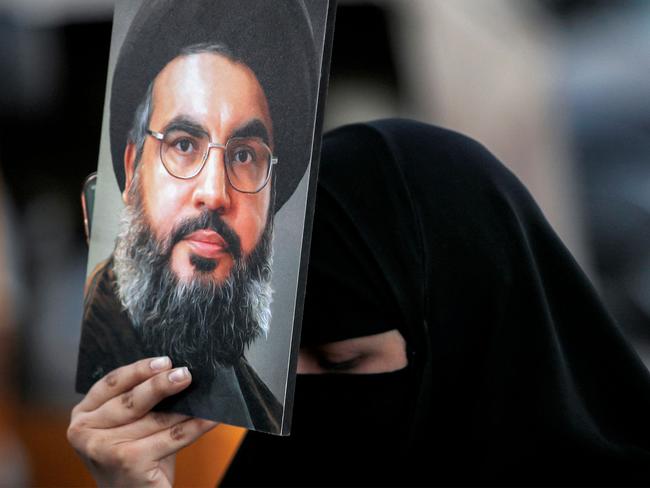
But the paper also cited Israeli officials as saying the strike’s timing “was opportunistic, coming after Israeli intelligence learned about the meeting hours before it occurred”.
Israel has not specified the weaponry used in the strike.
The New York Times said analysis of a military video indicates the aircraft used had been “fitted with at least 15 2000-pound (907kg) bombs”.
Sources with a line to Tehran told Reuters that Iran’s Supreme Leader Ayatollah Ali Khamenei has gone into hiding following the death of Nasrallah.
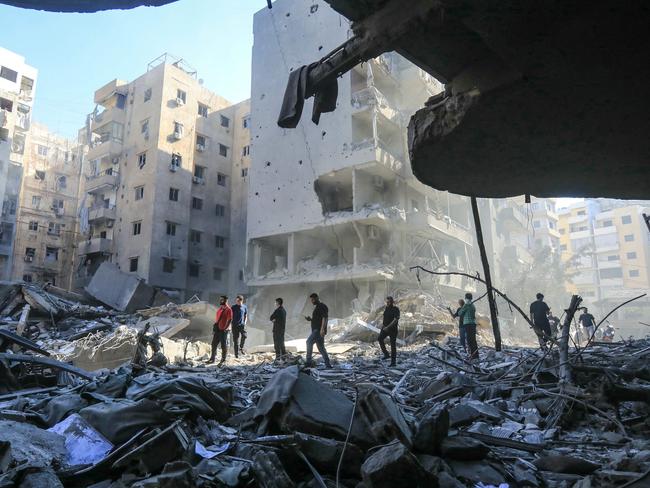
Jubilant Israeli Prime Minister Benjamin Netanyahu gave a public address referring to Nasrallah as the “central engine of Iran’s axis of evil.”
“The one who rises to kill you — rise and kill him first,” the Israeli Prime Minister said.
“We have settled accounts with the man responsible for the murder of countless Israelis and many citizens of other nations, including hundreds of Americans.
“Nasrallah was not just another terrorist. He was the terrorist. He was the core, the central engine of Iran’s axis of evil. He and his people were the architects of the plan to destroy Israel.
“He was not only operated by Iran; many times, he operated Iran himself. That is why, at the beginning of the week, I came to the conclusion that the powerful blows the IDF dealt Hezbollah in recent days were not enough.”
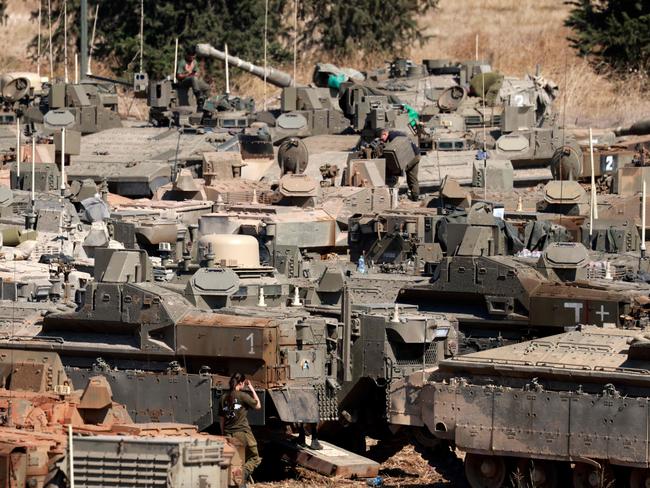
Khamenei, who is understood to have already been moved to safety, announced Iran would observe five days of mourning for Nasrallah, 64, who lead Hezbollah for 32 of its 42-years of existence.
“The blood of the martyr shall not go unavenged,” Khamenei said in a statement.
The sentiment was echoed by Iran’s First Vice President Mohammad Reza Aref.
“We warn the leaders of the occupying regime that the unjust bloodshed … especially of Hezbollah’s secretary-general, martyr Seyyed Hassan Nasrallah, will bring about their destruction,” Iran’s ISNA news agency quoted Aref as saying.
Iranian President Masoud Pezeshkian offered his condolences over Nasrallah’s death and accused the United States of “complicity” in his killing.
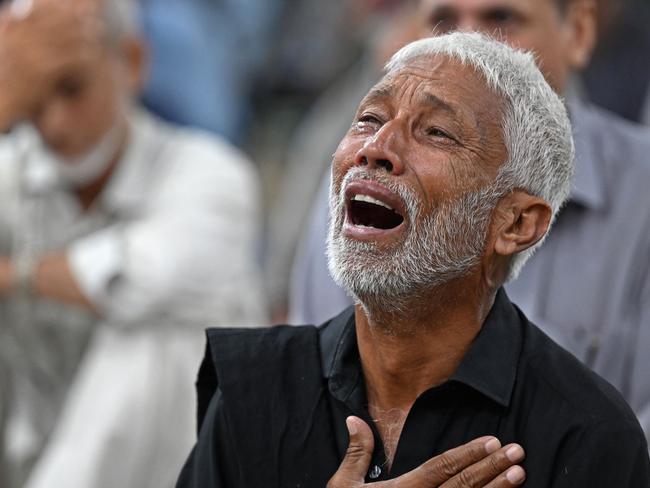
A black flag of mourning was hoisted at the Imam Reza shrine in Iran’s second city of Mashhad.
Mourners gathered waving yellow Hezbollah flags and chanting: “Death to Israel”, state TV footage showed.
Lebanon announced an official mourning period of three days.
US President Joe Biden described Nasrallah’s death as a “measure of justice” for those who were subjected to his “reign of terror”.
“President Biden and I do not want to see conflict in the Middle East escalate into a broader regional war,” Vice President Harris said in a statement.
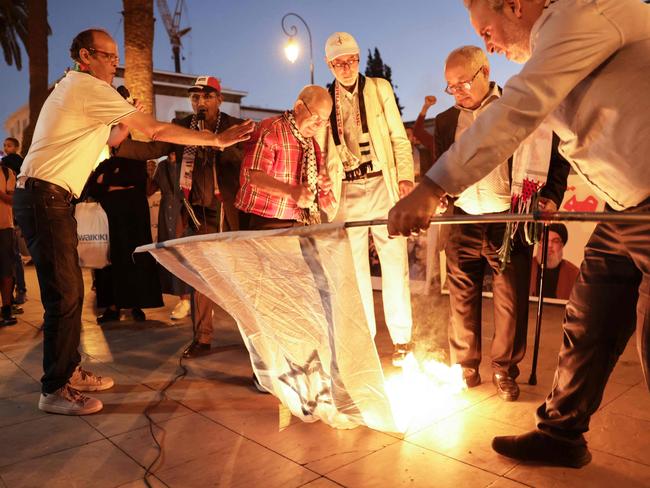
The Executive Council of the Australian Jewry’s co-CEO Alex Ryvchin tweeted on X that Nasrallah was a “butcher” who was “long considered untouchable”.
“The fact that its operatives can be blown away through their pagers, their commanders picked off and now their leader obliterated deals a powerful blow to global terrorism. Gratitude to the heroes of the IDF,” Mr Ryvchin said.




